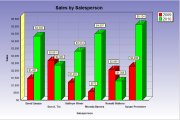 How many calls did your sales people make last week? Do you know how many dials, on average, were attempted for each contact made? Do you know the average call duration? Sales performance monitoring often tracks KPIs (key performance indicators) such as these. Are these useful data?
How many calls did your sales people make last week? Do you know how many dials, on average, were attempted for each contact made? Do you know the average call duration? Sales performance monitoring often tracks KPIs (key performance indicators) such as these. Are these useful data?
IMHO, the first “metric” only confirms that your reps can punch a keypad, the second affirms that you can count, while the last tells you diddly about the effectiveness or quality of the conversation. Although I’m skeptical that tracking this type of information has any value, I’m convinced that it offers zero insight without a greater context.
Some sales managers believe that tracking the number of calls made per day is a good measure of sales effectiveness. As far as I’m concerned, it doesn’t matter if this “metric” counts number of dials or how many actual conversations took place. Because ultimately this measurement tells you nothing about the quality of the call, rapport built, or product/prospect alignment.
Sales goals and quotas are necessary for setting expectations, achieving overall revenue goals, and identifying the success of any individual salesperson on the sales team. So, as a sales manager, how do you know what’s working and what needs improvement?
If a rep is failing, there is no point coaching on closing techniques if ability to close isn’t the real issue. Objectives need to be set within the context of a defined sales process. When the various stages of the process are tracked in your CRM system it’s possible to identify gaps in both behavior and execution. Evaluate the progress of sales opportunities over time and the point where sales typically bog down should jump up and bite you.
Some companies invest in customer relationship management but fail to realize the full benefits of the system. Implementing a CRM system requires an investment that goes beyond paying for services and software. Planning and designing a system that supports your sales processes and stages means you can move beyond dated metrics like counting activities and focus on behaviors that can be modified in a meaningful way to get results.
Identifying critical activities that drive sales success is one thing, effectively managing behavior based on a sales process is another. Don’t confuse the two.
